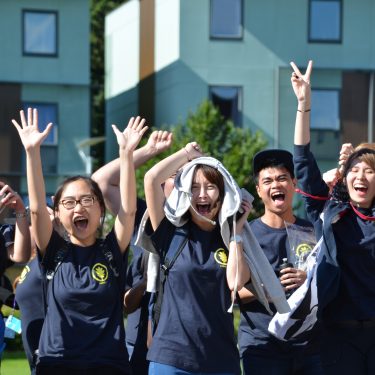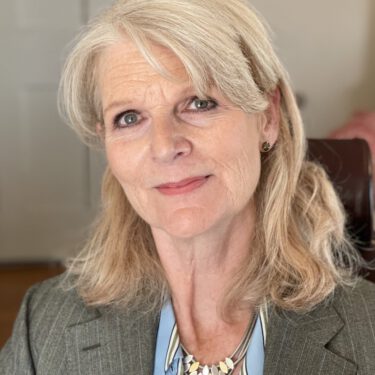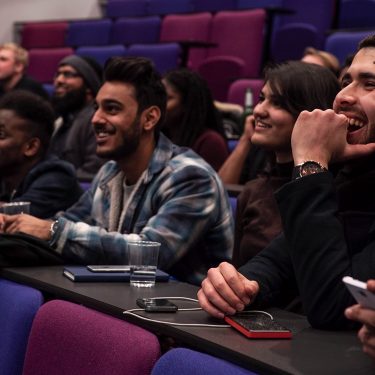Students want universities to prioritise a return to in person teaching and are missing face-to-face interaction around their wider student experience, according to a major new survey.
The poll of university students for the UPP Foundation – commissioned for the launch of the Student Futures Commission today (May 25th) and undertaken by Cybil – shows that more than half of all students (59 per cent) see face-to-face teaching as a top priority for September 2021 onwards.
More than half of all students also said that they haven’t participated in any extra curricular activities, face-to-face or virtual, over the last year – and nearly 8 in 10 say this was less than they were expecting to do.
But students also recognise the advantages of a shift towards digital learning, and are interested in a blended model of teaching. When given specific options for how they would like their course structured, the most popular option (45 per cent) is for it to be moved to a mostly in-person method of delivery with online teaching once or twice per week. Some with 21 per cent saying they wanted to study mostly online, 29 per cent fully face to face and 6 per cent fully online.
Students have reported wider challenges with their time at university during the pandemic:
- Nearly four out of five students reported a negative effect on their mental health from their experiences this year, with almost a quarter saying it has had a very negative impact
- Some 63 per cent of university students believe they are below where they would expect to be academically
- But 48 per cent think they haven’t missed any aspect of teaching and 72 per cent are neutral or satisfied with the way universities have managed student assessment
Looking to the future, only half of undergraduates are confident about the job market – but 65 per cent think their time at university will help them secure a job. Students are placing greater importance on job security, training, and career prospects when thinking about a new job– but the location is less important. This offers opportunities for firms and students who may not want to move to major urban areas, and could form an important part of the government’s levelling up agenda.
The UPP Foundation is a charitable trust created by University Partnerships Programme (UPP) to help tackle the biggest issues facing the higher education sector. It has convened the Student Futures Commission to explore these issues. Chaired by former UCAS Chief Executive Mary Curnock Cook CBE, and with partners including Shakespeare Martineau, Wonkhe, and Group GTI, the Student Futures Commission has been set up to explore how, in light of the disruption everyone has faced during the pandemic, universities can take action to support students from September 2021 to make the best of their remaining time at university and support those who are starting their journey in higher education this year.
The Commission is officially launching today, and has published a Terms of Reference and Written Call for Evidence on https://upp-foundation.org/student-futures-commission/
Mary Curnock Cook CBE, the Chair of the Student Futures Commission, said
“These findings point to a need for the whole sector to mobilise to help improve students’ confidence in themselves, in their job prospects and in the richness of the student experience that comes from physically joining the university community. This is the key aim of the Student Futures Commission – everyone wants our students back, and we want them to put the pandemic behind them and get the full benefits of a university education.”
Richard Brabner, the Director of the UPP Foundation, said
“Universities have gone to extraordinary lengths to support students this year, but as the polling shows nothing beats a proper campus experience. More than anything else students want in-person experiences and face-to-face teaching. As university life returns to something like normal in September, this is the least we can do.”
Notes to editors
The UPP Foundation is a registered charity that offers grants to universities, charities and other higher education bodies. In recent years, as higher education has expanded, the burden of paying for a degree has shifted towards the individual. This presents difficulties in maintaining the ‘University for the Public Good’, as well as ensuring there is greater equity in going to, succeeding at and benefiting from the university experience. The UPP Foundation helps universities and the wider higher education sector overcome these challenges. The UPP Foundation was created in 2016 by University Partnerships Programme (UPP), the leading provider of on campus student accommodation infrastructure and support services in the UK.
The UPP Foundation Student Futures Commission is a major new initiative aiming to make recommendations onuniversities can take action to support students from September 2021 to make the best of their remaining time at university and support those who are starting their journey in higher education this year. It will produce regular outputs during its period of sitting, in order to allow universities to consider these before and during the start of the next academic year. The Commission will make a final report by the end of the calendar year.
In total, there are 18 Commissioners. They are
- Professor Colin Bailey CBE – President and Principal, Queen Mary University, London
- Mark Blythe – Founder and Group Director, Group GTI
- Richard Brabner – Director, UPP Foundation
- Anne Marie Canning MBE – Chief Executive, The Brilliant Club
- Mary Curnock Cook CBE, Former Chief Executive, UCAS (Chair)
- Professor Juliet Foster – Dean of Education, King’s College London
- Professor Becky Francis – Chief Executive, Education Endowment Foundation
- Hillary Gyebi-Ababio – Vice President Higher Education, National Union of Students
- Stephen Isherwood – Chief Executive, Institute of Student Employers
- Smita Jamdar – Partner, Head of Education, Shakespeare Martineau
- Alistair Jarvis – Chief Executive, Universities UK
- Omar Khan – Director, Transforming Access and Student Outcomes in Higher Education (TASO)
- Nikita Khandwala – Strategy Analyst at LinkedIn and Co-Founder of Unbox
- Mark Leach – Chief Executive and Editor in Chief, Wonkhe
- Kate Owen, Chief Marketing Officer, UPP
- Meg Price – President, Worcester Students Union
- Professor Lisa Roberts – Vice Chancellor, University of Exeter
- Professor Mary Stuart CBE – Vice Chancellor, University of Lincoln
The Commission is supported by a number of partners including Shakespeare Martineau, Group GTI, and Wonkhe. Representatives from the partner bodies are sitting as Commissioners in their own right and will participate fully in the work of the Commission. The Commission is being managed by Public First who are acting as the Secretariat.
The survey was sent out and responses gathered via Group GTI’s Cibyl database of 1.5 million UK students from 140+ universities across all year groups, ethnicities, gender, sexuality and socio-economic profiles. Cibyl were used as a research partner, to support with research design, survey programming, responses collection and data processing. They surveyed 2,147 university students from across the UK between 14th-19th May.








